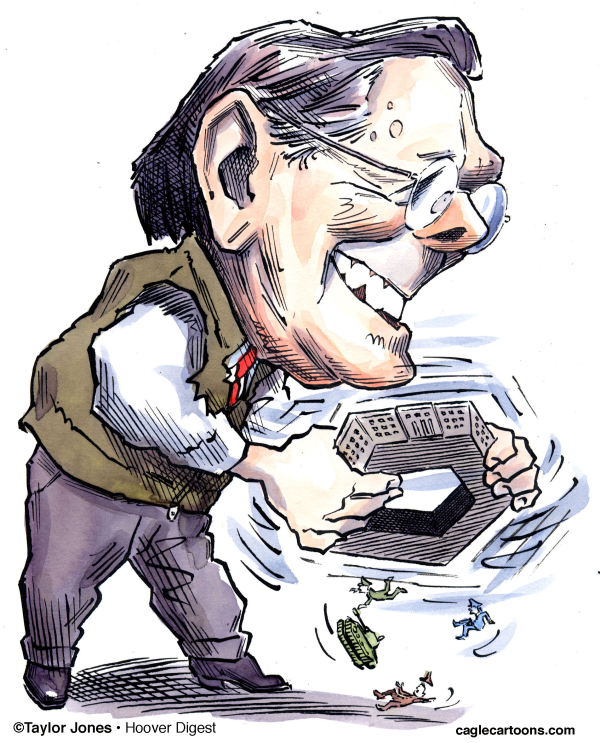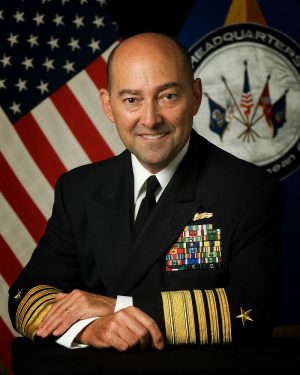
In the mid-2000s, I spent two years as senior military assistant to Secretary of Defense Donald Rumsfeld, acting essentially as his military gatekeeper and translating his orders to the U.S. military via the Joint Chiefs of Staff. Before joining his team, I had been a Navy one-star admiral and commander of Enterprise Carrier Strike Group, in charge of 10,000 sailors and a dozen ships in combat in the Arabian Gulf.
I mention that because my duties suddenly shifted from a pinnacle of command at sea to overseeing administrative misery: making sure the PowerPoint briefs the secretary saw had page numbers in the right place (lower right corner), that our protocol team put up the right flags when foreign leaders came to the Pentagon (we blew that more than once, to the secretary's extreme annoyance), and that the schedule ran on time (it never quite did).
But I had one other duty that defined the tour, and epitomized my two years around Don Rumsfeld: the game of squash. For those unfamiliar, squash consists of hitting a very small, dense black ball in an indoor court about the size of a racquetball venue, or roughly 20 feet by 30 feet. The front wall has a tin strip at the bottom, and if you hit it you lose the point. If you hit your opponent — and it hurts like hell — you win the point.
The ball — especially the hard ball esteemed by the secretary — goes very, very fast, approaching 200 miles per hour when it comes off the small racket. Rumsfeld, who died on Wednesday, became devoted to the game in his middle years, and was intensely competitive. He would often leave blood on the walls from bouncing off them hard.
Almost every afternoon, after the end of the workday, either I or my civilian equivalent, Larry Di Rita, would walk down to the squash courts in the Pentagon and do battle with the secretary. While both Larry and I had been varsity squash players at Annapolis on nationally ranked teams, and were more than two decades younger than the secretary, Rumsfeld would generally give as good as he got on those hardwood floors.
The only real sin by me or Larry would have been to give him a point — if he had ever detected a shred of "let the boss win," we'd have been fired on the spot. The morning after each match, the loser had to put a yellow Post-it on the door to the secretary's inner office with the score and the victor's name circled.
So what did I learn on those afternoons about Don Rumsfeld?
I never met a more intense competitor on an athletic field. He threw himself at the game with utter abandon, smashing into the walls, shoving his opponent aside, and striking the ball with immense gusto. He played the game in a very straight-ahead manner, as he did everything, driving the ball down the sides of the court and hitting as hard as he could on virtually every shot. No drop shots or fancy corner plays. When he won a point, he would turn to his opponent with a smirk and say, "speed kills." I suspect some of his government and business opponents over the years could identify with that quite clearly.
Rumsfeld also personified the idea of never quitting. Like Winston Churchill, someone he admired, he was a proponent of the dictum: "Never give in. Never, never, never, never — in nothing, great or small, large or petty — never give in." He could be behind by a ridiculous number of points, but his drive and determination were simply unabated. It was a quality that served him well in a long and eventful life, from Oval Office meetings to Fortune 500 boardrooms.
Finally, again and again, I saw his love of fitness. He'd been a champion wrestler at Princeton (as well as a football player), and Don Rumsfeld always wanted to be in shape, to play all sports well, to excel at athletics not only as a competitive endeavor, but as a way to health and a long life with his wife, Joyce, and children and grandchildren. Squash, tennis, riding, skiing, biking, speed walking — anything to be fit and trim.
I saw him for the last time a couple of years ago, at the offices of the foundation he and Joyce created to help foster relations between the U.S. and Central Asia. I asked him if he was playing squash (he was in his mid-80s and ailing with shingles) and all he said, with that classic Rumsfeld look of good humor, as though he was playing a joke on the listener, was: "Speed kills. And don't you forget it."
Godspeed and open water, Mr. Secretary. I hope there is a squash court in heaven for you.
(COMMENT, BELOW)
- Stavridis is a Bloomberg columnist. He is a retired U.S. Navy admiral and former supreme allied commander of NATO, and dean emeritus of the Fletcher School of Law and Diplomacy at Tufts University. He is also an operating executive consultant at the Carlyle Group and chairs the board of counselors at McLarty Associates.
Previously:
• 02/16/21 Keeping troops in Afghanistan makes America safer
• 08/19/20 Military reasons to celebrate the Israel-UAE deal
• 07/02/20 Taliban bounties would be a new low even for Putin
• 01/02/20 May the 'Space Force' be with you
• 08/02/19 What Iran will do next, and how to stop it
• 05/06/19 The 'Five Eyes' intelligence-sharing alliance should expand, starting with Israel and Japan
• 04/24/19 Sri Lanka attacks mark the birth of terrorism 3.0
• 01/14/19 Iran's tiny navy is trying to revive the Persian Empire
• 06/04/18 US was right to give China's navy the boot
• 06/04/18 Big winner of Colombia's election is the US
• 05/17/18 Great power politics is back as U.S. aims at Russia with resurrected Navy fleet
• 03/20/18 Fake advice for Putin's fake win


 Contact The Editor
Contact The Editor
 Articles By This Author
Articles By This Author